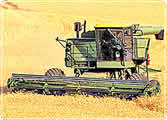Agriculture
Farming in the UK has always had an impact on the countryside and agricultural practices have always fashioned the landscape. Modern farm practices are now very intensive and have accelerated the negative impacts on biodiversity.
 Greater mechanisation, the development of agri-chemicals (fertilizers and pesticides) and intensive farming techniques have largely been responsible for this change. Worldwide there has been a rapid rise in the human population which has led to a greater demand for agricultural land and a dramatic impact on natural habitats.
Greater mechanisation, the development of agri-chemicals (fertilizers and pesticides) and intensive farming techniques have largely been responsible for this change. Worldwide there has been a rapid rise in the human population which has led to a greater demand for agricultural land and a dramatic impact on natural habitats.
More sustainable methods of Agriculture are possible and can have a very positive effect on biodiversity.
Some interesting farming facts:
(Source - Conservation in Britain – WR Pickering)
- 75% of England is designated as farmland, only 2% of the population are involved in farming.
- In 1850, one farm worker produced enough food for 4 people, now the same worker produces enough for 60 people.
- In 1942 there were about 90,260 tractors and 700,000 horses in agriculture in England and Wales, by 1982 this had changed to 415,839 tractors and virtually no horses. (DB Davies – Trends in mechanisation in the lowlands – Agricultural Development and Advisory Service)
Agriculture has had an impact on biodiversity in the following ways:
- Intensive farming techniques (monocultures and mechanisation)
- A rise in the use of fertilisers
- The widespread use of pesticides
- Intensive farming techniques leading to soil erosion
- Drainage of wetlands
- Hedgerow removal
- Loss of genetic variation (selective breeding)
- Eradication programmes (Badgers and TB)
 Monoculture
Monoculture


What's your opinion?
Average rating




Not yet rated